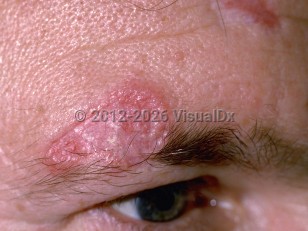- Neonatal lupus erythematosus – Beginning in the first few months of life.
- Discoid lupus erythematosus – Predominantly skin lesions during childhood.
- Subacute lupus erythematosus – Skin lesions during childhood.
- Systemic lupus erythematosus
- Lupus panniculitis
Discoid rash is one of 11 clinical criteria for the Systemic Lupus International Collaborating Centers (SLICC) classification of systemic lupus erythematosus (SLE) and is a contributor to the musculoskeletal clinical domain within the European League Against Rheumatism / American College of Rheumatology (EULAR / ACR) classification criteria for SLE.
DLE may be localized or generalized. Localized DLE is limited to the face, scalp, ears, and neck, while in generalized DLE, there may be lesions both above and below the neck. It is rare for DLE to be isolated below the neck. Rates of progression of cutaneous lupus to systemic lupus range from 0%-31% in pediatric populations. Risk factors for SLE include mucocutaneus involvement, arthralgias ⁄ arthritis, nail changes, anemia, leukopenia, an elevated ESR, and a positive test for antinuclear antibodies (ANA).
Related topics: drug-induced lupus erythematosus, lupus panniculitis, neonatal lupus erythematosus, tumid lupus erythematosus



 Patient Information for
Patient Information for 
